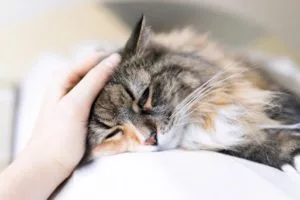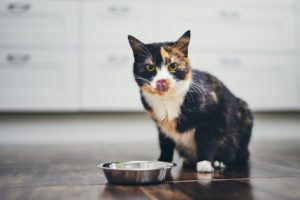5 Signs of Heart Failure in Cats
5 Signs of Heart Failure in Cats
The early signs of heart failure are difficult to detect in cats. The more you understand feline heart failure and its symptoms, the more chance there is for a better outcome.
One of the first signs of heart failure is a lack of energy. The heart must work harder, which exhausts the cat, especially during exercise or play. There may also be respiratory problems, such as shortness of breath.
If your cat suffers from heart failure, they may also lose their appetite. If you want to know the five signs of heart failure, take a look at this article.

What is Heart Failure in Cats?
The heart pumps blood to all sections of the body and ensures that each one receives the right volume of oxygen and nutrients to be able to function correctly. The right side of the heart pushes deoxygenated blood to the lungs, and the left side drives oxygen-rich blood to the body once it has been sent back from the lungs.
Heart failure in cats is when the heart is weakened and fails to pump enough blood within the body. Since blood carries oxygen and nutrients, a lack of oxygen affects the body’s organs. It leads to a buildup of unwelcome fluid in the body.
Heart failure can cause many uncomfortable symptoms, which can be life-threatening if left untreated. When heart failure is present, the heart has difficulty bringing enough oxygen to the tissue and is slow to eliminate waste in the body.
What Are the Signs of Heart Failure in Cats?
The first signs of heart failure are usually nonspecific. Lack of energy or appetite loss can be the first of other symptoms to come. The following includes the five significant signs of heart failure in cats:
Heart Murmur
When the cat’s heart loses its capacity to pump blood efficiently, it begins to beat in a pattern known as a murmur. The loudness of the murmur is indicative of the amount of instability in the heart. However, the loudness of a heart murmur is not always related to the severity of the illness. Murmurs are graded based on their intensity.
Murmurs are also distinguished by the time they occur in the heart cycle and their location. They may also be characterized by where they are the loudest. Most murmurs in cats occur when the heart is contracting to pump blood out.
Heart Rhythm and Respiratory Disorders
Cats who are suffering from heart failure may have shortness of breath, or they may breathe too fast. The most common reason there is respiratory distress is the buildup of fluid in the chest cavity. When fluid accumulates in the chest, the lungs do not inflate correctly. Fast, shallow breathing occurs. The cat may also have a higher heart rate than normal.
Lack of Energy/Loss of Appetite
These two signs of heart failure are critical to note and often coincide. The cat may develop exercise intolerance when cardiac damage worsens, and cats with heart failure often find exercise exhausting. It starts with them being disinterested in play, often leading to absolute lethargy. They will also have a poor appetite due to fluid, and the swelling can trigger extreme nausea.
Abdominal Bloating
Gastrointestinal symptoms could be indicative of heart failure. Cats who have right ventricular insufficiency sometimes develop swelling in the abdomen. As a result of fluid retention caused by heart failure, fluid builds up in the gastrointestinal tract, which causes bloating. When it occurs, the cat’s stomach may appear distended.
Poor Circulation
Often, poor circulation is one of the symptoms of heart failure in cats. The cat may have:
- Cold extremities
- Bluish foot pads or nail beds
- Gray-colored gums and tongue
The cat may also have bluish mucus membranes of the mouth, eyes, or sexual organs when obstacles or narrow paths make it problematic for blood to get through to the body. The cells do not derive the oxygen required for the blood to be evenly distributed in the body.
What Are the Causes of Heart Failure in Cats?
Cardiomegaly is used to indicate heart enlargement. Pet parents must be mindful that an enlarged heart causes congestive heart failure in cats. Some of the general triggers for heart failure in cats include:
- Blood clots in the heart
- Heart wall defects
- Fluid in the sac surrounding the heart
- Heart rhythm abnormalities
- Heart valve deficiencies or blockages
- High blood pressure
- Hyperthyroidism
- Hypertrophic cardiomyopathy
Other causes include pregnancy, heartworm disease, tumors, and anemia. Also, congenital deformities sometimes occur when a cat is born, which causes heart failure.
What is the Treatment for Heart Failure in Cats?
Early detection is critical for a better prognosis with any cardiac disorder. Treatment will be contingent on the underlying origin of the heart issue and the overall state of the cat’s health.
For example, if the cause of heart failure is hyperthyroidism, treatment will be focused on stabilizing the thyroid hormones. The goal of therapy is to stabilize the cat’s health and prevent the illness from further development.
Cats in a dire situation will need to be hospitalized until their blood and oxygen levels go back to normal, and excess fluid may also be drained with a catheter. With heart failure, the right treatment plan is the one that will best improve their quality of life, as well as prolong it. Some of the common medications prescribed for cat heart failure include:
Beta-Blockers
Beta-blockers lower the cat’s heart rate and treat high blood pressure. It slows down the heart so it can function correctly.
Calcium Channel Blockers
Calcium channel blockers are used to treat cats with hypertrophic cardiomyopathy and to treat systematic hypertension.
Angiotensin-Converting Enzyme
ACE inhibitors are often employed to treat congestive heart failure. They help inhibit certain hormones that are enhanced in cats with heart disease.
Diuretics
Diuretics help the kidneys flush out excess fluid and help maintain normal blood volume. It keeps the heart from spending as much effort pumping blood.
Anticoagulants
Anticoagulants prevent the formation or growth of blood clots. They must be used with caution, as they can cause hemorrhaging.
How Can Food Help Prevent Heart Failure?
If you want to maintain your cat’s health, there are some natural ways to accomplish this. Proper diet and exercise can help support a healthy heart in cats. Look for certain ingredients when feeding your cat the right food to help maintain their health.
Fiber can help their gastrointestinal system. Ensure that the diet you choose is all-natural with no added fillers. Your cat will also need adequate vitamins and minerals to stay healthy. Also, look for heart-supporting supplements in food:
- Taurine
- Omega 3’s
- Omega 6’s
- Carnitine
- B-vitamins
- Vitamin E
- Magnesium
Taurine deficiency inhibits the heart from contracting normally. Giving your cat food with taurine can help with proper heart functioning. Carnitine is essential for muscle tissue and receiving energy. Cat food that is rich in omega 3’s will relieve inflammation. Plant oils have omega 6’s and can help balance omega 3’s.

Conclusion
When heart failure is detected early, there is a good chance for a better prognosis. If you see your cat demonstrating any of the symptoms mentioned in this article, get them to the vet immediately.
